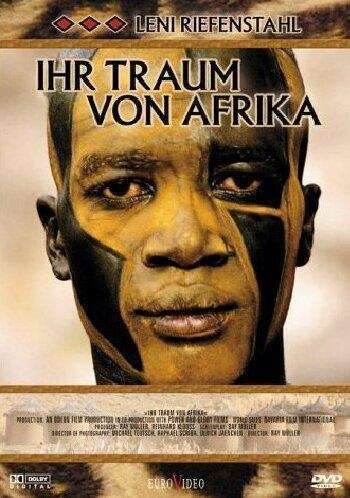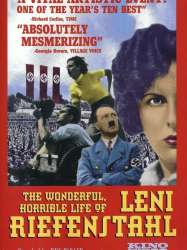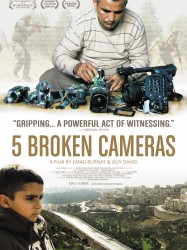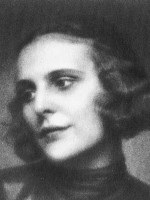Leni Riefenstahl: Her Dream of Africa is a film of genre Documentary with Leni Riefenstahl
Leni Riefenstahl: Her Dream of Africa (2003)

If you like this film, let us know!
Length 59minutes
Genres Documentary
Themes Films set in Africa, Documentary films about business, Documentary films about the film industry, Documentaire sur une personnalité
Rating67%










Leni Riefenstahl: Her Dream of Africa (Leni Riefenstahl: Ihr Traum von Afrika) is a 2000 documentary-film by Ray Müller. The film follows Leni Riefenstahl's return to Sudan to visit the Nuba tribe whom she published photographs of in best-sellers such as The Last of the Nuba and The People of Kau. It is the second collaboration between Riefenstahl and Müller. She was the subject of his acclaimed 1993 documentary The Wonderful, Horrible Life of Leni Riefenstahl, which followed her life and reflected on her Nuba activities.
Synopsis
At the age of 97 Riefenstahl returns to Sudan for one final farewell to the Nuba that she lived with for 8 months and photographed and filmed extensively. Müller documents her return after 23 years away and her reaction to the collapsing culture that she once celebrated so avidly in her photographs.Actors
Comments
Leave comment :
Suggestions of similar film to Leni Riefenstahl: Her Dream of Africa
There are 12 films with the same actors, 8969 with the same cinematographic genres, 4092 films with the same themes (including 3 films with the same 4 themes than Leni Riefenstahl: Her Dream of Africa), to have finally 70 suggestions of similar films.If you liked Leni Riefenstahl: Her Dream of Africa, you will probably like those similar films :
 , 3h8
, 3h8Genres Documentary
Themes Films about films, Documentary films about business, Documentary films about the film industry, Documentaire sur une personnalité
Actors Leni Riefenstahl, Marlene Dietrich, Luis Trenker
Rating79%





La vie et l'œuvre de Leni Riefenstahl, qui au contraire de ses homologues qui, tel Fritz Lang, quittèrent l'Allemagne nazie, refusa de partir et devint la cinéaste attitrée du national-socialisme.
 , 52minutes
, 52minutesOrigin France
Genres Documentary
Themes Films set in Africa, Documentary films about business, Documentary films about the film industry, Documentaire sur une personnalité
This documentary portrays a great Sudanese filmmaker, Gadalla Gubara (1920-2008), one of the pioneers of cinema in Africa. Through his works, Gadalla shows us a mysterious and misunderstood country, Sudan. Despite censorship and the lack of financial backing for over sixty years, he produced an independent and unique cinema in a country where freedom of expression is a rare luxury. This film follows the struggle of the man who received the Excellence Career Award at the 2006 African Academy Awards, Nigeria.

Five Broken Cameras (2011)
, 1h34Origin Israel
Genres Drama, War, Documentary, Crime
Themes Films set in Africa, Films about films, Films about religion, Documentary films about business, Documentary films about the film industry, Documentary films about law, Documentary films about war, Documentary films about historical events, Documentaire sur une personnalité, Documentary films about politics, Documentary films about religion, Political films, Films about Jews and Judaism, Documentary films about films
Rating78%





There are five cameras — each with its own story. When his fourth son, Gibreel, is born in 2005, self-taught cameraman Emad Burnat, a Palestinian villager, gets his first camera. At the same time in his village of Bil’in, the Israelis begin bulldozing village olive groves to build a barrier to separate Bil'in from the Jewish Settlement Modi'in Illit. The barrier's route cuts off 60% of Bil'in farmland and the villagers resist this seizure of more of their land by the settlers.
 , 1h35
, 1h35Genres Documentary
Themes Films set in Africa, Films about films, Documentary films about business, Documentary films about the film industry, Documentary films about law, Documentary films about war, Documentary films about historical events, Documentaire sur une personnalité, Documentary films about politics, Political films, Documentary films about films

The Legend of Marilyn Monroe (1966)
, 53minutesDirected by Terry Sanders
Origin USA
Genres Documentary
Themes Films about television, Documentary films about business, Documentary films about the film industry, Documentaire sur une personnalité
Actors John Huston
Rating70%






In Bad Taste (2000)
, 1h40Directed by Steve Yeager
Origin USA
Genres Documentary
Themes Films about sexuality, LGBT-related films, Documentary films about business, Documentary films about the film industry, Documentaire sur l'homosexualité, Documentaire sur une personnalité, LGBT-related films, LGBT-related film
Actors John Waters, Steve Yeager, Steve Buscemi, Johnny Depp, Divine, Debbie Harry
Rating70%






Directed by Arin Paul
Genres Documentary
Themes Documentary films about business, Documentary films about the film industry, Documentaire sur une personnalité
This documentary looks deep into the life and works of Mr. Nripen Ganguly who had won the National Award for his film Bhombal Sardar (1984). Also very interesting facts about Satyajit Ray, Ritwik Ghatak & Mrinal Sen are revealed.

Trente tableaux (2011)
, 1h21Directed by Paule Baillargeon
Genres Documentary
Themes Feminist films, Politique, Documentary films about business, Documentary films about the film industry, Documentaire sur une personnalité, Documentary films about politics, Political films, Documentary films about Quebec politics, Autobiographical documentary films
Actors Paule Baillargeon
Rating61%





L’actrice et réalisatrice Paule Baillargeon retourne au pays de son enfance : l'Abitibi. Sur la route de Montréal à Val-d'Or, des instants qui ont marqué son existence resurgissent dans sa mémoire. À travers cet autoportrait hybride, Baillargeon raconte le parcours d’une femme, d'une féministe, d'une mère, d'une artiste.
 , 1h
, 1hDirected by Raphaël Millet
Origin France
Genres Documentary
Themes Films about writers, Films about journalists, Documentary films about business, Documentary films about the visual arts, Documentary films about the film industry, Documentaire sur une personnalité, Political films
Actors Pierre Schoendoerffer, Costa-Gavras, Raoul Coutard, Jacques Perrin
Pierre Schoendoerffer revisits his life and career, with a strong focus on the impact that his experience as a war cinematographer for the French army during the Indochina War had on him, as well as a war reporter during the Vietnam War when he filmed his 1967 Academy Award winning documentary The Anderson Platoon named after the leader of the platoon - Lieutenant Joseph B. Anderson - with which Schoendoerffer and his crew were embedded.

Marfil (2011)
, 30minutesGenres Documentary
Themes Films set in Africa, Documentary films about business, Documentary films about the film industry
The first filmmaker arrived in Equatorial Guinea in 1904. The last movie theatre closed in Malabo in the 1990s. In 2011, during the II African Film Festival of Equatorial Guinea, the Marfil Movie Theatre reopened its doors. Florencio, Ángel and Estrada tells us how cinema has been, and is still, present in their lives.
 Connection
Connection
